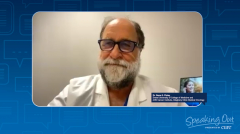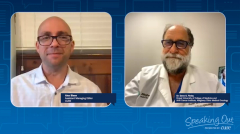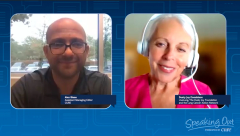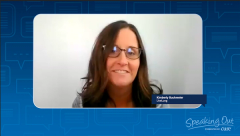
Education Crucial in Cancer, ‘One of The Most Confusing Areas of Medical Treatment’

As part of its Speaking Out® video series, CURE® spoke Dr. Gene G. Finley of Drexel University of College of Medicine and AHN Cancer Institute, Allegheny Clinic Medical Oncology, about education disparities among patients with lung cancer.
Episodes in this series
Alex Biese: Hi, my name is Alex Biese. I'm the assistant managing editor of CURE® magazine. In this edition of the Speaking Out® video series, I'm speaking with Dr. Gene G. Finley, assistant professor at Drexel University College of Medicine, and a medical oncologist at AHN Cancer Institute, Allegheny Clinic Medical Oncology. We are discussing disparities in education regarding issues related to lung cancer, including biomarker testing. Dr. Finley, thank you so much for taking some time to talk today.
Dr. Gene G. Finley: My pleasure, Alex, very nice to meet you today.
Biese: It's very nice to meet you too, sir. So, to start off, how can a patient with lung cancer benefit from being educated about their disease?
Finley: The difficulty there is that people have varying levels of experience and education in medical conditions. So, cancer has been one of the most confusing areas of medical treatment. That's because many of the drugs that we use are potentially toxic. Surgery can be very disabling. And radiation treatments have many of their own toxicities. And these are the traditional mainstays of therapy. So many patients have a great deal of fear and apprehension, not only from hearing that they have cancer, but anticipating that the doctor may be recommending chemotherapy, and they may have a lot of concerns, a lot of fear, from getting cancer treatment.
So I think one barrier is just the fear factor. And I think that that's really our role as cancer doctors, whether we're surgeons or radiation doctors, or in my case, medical oncologists, where we need to educate the patient about their disease, and about the available treatments and what can be expected, what are the side effects and so forth. And I think that's really critical, because that does take away a lot of the fear.
So many patients say after they've had some treatment, "Gee, doctor, I, you know, I'm really happy, it really was much easier than I thought it would be much easier than when Uncle Joe had it in 1985." So, you know, things have come a long way in cancer treatment. And they've also come a long way in terms of cancer education. And that's your topic for this interview.
Biese: How can a lack of education adversely impact a patient's experience during their cancer journey and potentially adversely impact outcomes?
Finley: Yeah, so we do have patients even today, where that level of fear and apprehension leads them to avoid coming to the doctor at all. So what we find, particularly in lung cancer, is a failure of screening, as you know or you may or may not know that we have really excellent screening techniques which have been shown to reduce death rates from lung cancer and that's the low-dose, CT scan of the chest. And that's really revolutionized lung cancer treatment.
For decades, we've tried chest X-rays as screening methodologies or sputum, or, you know, looking at the phlegm for cancer cells. None of that's panned out. But the CT scan, which can be done very quickly, has been an excellent tool. But if you're afraid to go to the doctor, or you're afraid to get tests, then you have a failure of screening.
And COVID really put a monkey wrench in all of this stuff. And we've seen an increase in mortality rates in a number of different cancers related to poor screening. So screening is one place where we really need to continue this educational process to improve patient's ability to get screened and have their cancer discovered and treated at an earlier stage.
Biese: Beyond that fear factor, what do you think are some of the other elements that are driving these disparities in patient education right now?
Finley: Well, that's one of the main ones, I would say. But again, everyone's behavior is colored by personal experience. And so many people with cancer, of course, as you know, approximately one in two Americans gets cancer in their lifetime. Now, some of these are things like early stage prostate cancer, that don't amount to much. But there's quite a bit of cancer in this country, over a million new cases of cancer a year. So it is a big issue for us to get patients in and screened timely.
But in terms of treatment, treatment is a very involved process, taking care of patients with cancer. And it's not only very involved on the part of the clinician and the care team, it's very involved on the patient side and the caregiver side. So that's where education of the patient about what they have, what can be done about it, whether it's curable or not curable, what are the expectations for treatment, what are the side effects, and so forth, those are critical to get everyone on the same page. Because many patients have different values than perhaps you or I might have. And many things that are more important to them than having a prolonged survival, they may be interested more in quality of life. So we have to adjust what we would do with one patient who's extremely motivated to get everything possible with another patient that wants to take a more relaxed approach to the management of their cancer. So that's one thing.
The other thing that I think is important is we participate in a number of quality efforts, which we (use to) evaluate our treatments, we evaluate how we interact with patients. And we are involved with the ASCO QOPI program, which is a quality improvement program.
And as part of that, that educational aspect has come to the fore. So they have what we call the pre-teach where each patient who has cancer who's going to get treatment has to undergo an educational program with the nurse, with the treatment nurse, with a nurse practitioner and a clinical pharmacy specialist and the doctor, and they meet with a patient separate from the clinic visits to describe in much more detail the nature of the disease and the types of treatments that are planned, so that the patient knows — because the more knowledge the patient has about their disease and about the treatments and the expected results and potential side effects, then the more comfortable they are with the whole process. So that's been a huge advance. And hats off to ASCO and the other organizations that have spearheaded this activity because it's been really a boon to patients and almost universally they are very pleased with the amount of knowledge that they have going into the treatment cycles.
Biese: I think that's a fantastic resource, because it seems to me that receiving a cancer diagnosis also comes with enrollment in a crash course in oncology that no one was expecting to have to take.
Finley: Exactly, that's exactly right. And it's difficult because again, we (have) to take people where they are. We have people that have PhDs in biology, and we have other people that are not very medically savvy. So that's where it becomes a challenge in how much information and how do you present the information. So it is difficult at times. But we're in far better shape to do that, we have far more resources to help people through the cancer treatment process than ever before.
Biese: And specifically regarding biomarker testing, what do you see as some of the major the gaps or disparities in education around that aspect of the cancer experience?
Finley: Again, this is an education process for the patients. But remember that all of these targeted drugs really started in about 2004 and 2005. Now, that sounds like a long time, but it really isn't very long. And so (since those) drugs have come in wide use in the 2009s or '10s, there were a lot of problems with physician education.
So in the lung cancer space, as we mentioned before, there was a lot of therapeutic reluctance to treat lung cancers, because we didn't have the spectacular drugs that we have now. So we had done some work looking at physician attitudes towards lung cancer. And this issue of finding these specific genes that can be targeted with special treatments that are not chemotherapy, so-called targeted drugs, which are often pills, and it's very advantageous to use those. But in order to use those, in order to open up that cabinet of medications that are potentially available, we have to get a sample of the tumor and subject it to genetic sequencing so we can find those special mutations that are driving the cancer.
So when we had first looked at this topic in the early 2000s, shortly after the advent of the first targeted drugs in lung cancer, we were finding that only about 20% or 30% of lung cancer patients were ever getting molecular testing, they were going straight on to chemotherapy, which had been shown to be effective. And the problem with that is a lot of these patients had missed out on the opportunity to have a much better and a much less toxic and a much more effective treatment. And so we undertook an education program at AHN involving clinicians involved in lung cancer care, pulmonologists, medical oncologists, radiation oncologists and surgeons. And we were able to improve our genetic testing rates in advanced lung cancer from the 20% to 30% range up to 80% or so. Which is really a great advance for us and this is where as a field we're looking at (it) as one of the most important things that we can do and we continue to stress that.
But that is something that was a hurdle years ago and it's much better now but there are still challenges depending on the institution you're at.
Biese: Well, doctor, thank you so much for sharing some insight on this topic. I and my audience really appreciate it. Okay, have a great day, sir.
Finley: All right. Thanks, Alex. Take care.
Transcription edited for clarity and conciseness.








